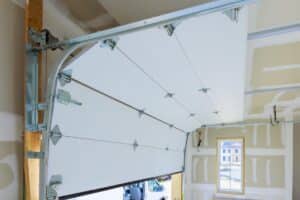Winter is a challenging season for many homeowners, particularly when it comes to maintaining their garage doors. Extreme cold can wreak havoc on these essential components, causing a range of issues that can be both inconvenient and costly. Understanding how cold weather affects your garage door and taking steps to winterize it can save you from unnecessary headaches and expenses.
How Extreme Cold Affects Garage Doors
Cold weather can be harsh on garage doors, leading to a variety of issues that can compromise their functionality and longevity. Here’s a closer look at how extreme cold can affect different components of your garage door:
Material Contraction and Expansion
When temperatures drop, the materials used in garage doors, such as steel and wood, undergo contraction. This physical change can create a range of problems that may disrupt the normal operation of your garage door.
Steel Doors
Steel garage doors are known for their durability and strength. However, they are not immune to the effects of cold weather. As the temperature decreases, steel contracts. This contraction can cause the door to become misaligned with its tracks. Misalignment can result in the door not closing properly or getting stuck halfway. In more severe cases, the contraction can cause the steel to warp, which can permanently affect the shape and operation of the door.
Wooden Doors
Wooden garage doors, while aesthetically pleasing and often preferred for their classic look, react differently to temperature changes compared to steel doors. Wood is a natural material that expands and contracts more significantly than steel. In extreme cold, wooden doors can become brittle, making them more susceptible to cracks and breaks. The repeated expansion and contraction due to fluctuating temperatures can weaken the wood over time, leading to structural issues that may require repair or replacement.
Impact on Door Springs
Garage door springs play a crucial role in the smooth operation of your garage door. They counterbalance the weight of the door, making it easier to open and close. However, these springs are highly sensitive to temperature changes.
In cold weather, the metal in the springs can become brittle. This brittleness increases the likelihood of the springs snapping under the tension they are under during operation. A broken spring can render the garage door inoperable, posing a significant inconvenience. Moreover, a snapping spring can be dangerous, as it can cause injury to anyone nearby or damage to property.
Motor and Opener Issues
The motor and opener mechanisms of your garage door are also vulnerable to the effects of cold weather. These components rely on electricity and a range of mechanical parts to function correctly.
In extreme cold, the lubricants used in the motor and opener can thicken, causing increased friction and making it harder for the motor to run efficiently. This can lead to slower operation or even a complete failure if the motor overheats or seizes up. Additionally, the batteries in the remote opener can lose power more quickly in cold temperatures, which might result in the opener not responding or working intermittently.
Weather Stripping and Seals
Proper weather stripping and seals are essential for maintaining the insulation and energy efficiency of your garage. However, cold weather can compromise these components as well.
When the temperature drops, the rubber or vinyl used in weather stripping can harden and crack. Damaged weather stripping allows cold air to seep into the garage, which can raise your heating bills and create an uncomfortable environment. Moreover, poor insulation can cause condensation to form on the inside of the door, leading to potential rust and further damage over time.

Common Problems Caused by Cold Weather
Winter’s chill can bring a host of issues for your garage door, potentially disrupting its operation and leading to costly repairs. Here’s a detailed look at the most common problems caused by cold weather:
Door Sticking
One of the most common problems during winter is a garage door sticking to the ground or its frame. This usually happens for a couple of reasons:
- Material Contraction: As temperatures drop, the materials of the door and the surrounding frame contract. This can cause the door to fit too tightly in its frame, making it difficult to open or close.
- Frozen Moisture: Snow and ice can accumulate around the base of the garage door. When this moisture freezes, it can cause the door to stick to the ground, requiring extra force to lift it and sometimes causing damage to the door or opener.
Frozen Door Mechanisms
The intricate mechanisms that allow your garage door to operate smoothly can seize up in extreme cold:
- Hinges and Rollers: These moving parts can freeze, especially if they are not properly lubricated. When hinges and rollers are frozen, the door may not open smoothly or may become stuck entirely.
- Tracks and Cables: Ice and frost can build up on the tracks and cables, obstructing their movement and leading to operational failures. This can necessitate frequent repairs or replacements if not addressed promptly.
Cracked Panels and Components
Cold weather can take a toll on the structural integrity of your garage door:
- Material Stress: As the materials contract in the cold, they can develop cracks. This is particularly true for wooden doors and older steel doors that may already have some wear and tear.
- Panel Cracks: Cracked panels are not only unsightly but can also compromise the insulation of your garage, leading to higher energy costs and further damage from moisture intrusion.
Opener Malfunctions
Garage door openers, which rely on a combination of electrical components and battery power, are particularly vulnerable to cold weather:
- Reduced Battery Power: Cold temperatures can significantly reduce the efficiency and lifespan of the batteries in your garage door opener. This can lead to the remote control failing to operate the door or needing frequent battery replacements.
- Electrical Issues: The electrical components inside the opener can be affected by the cold, leading to slower response times or even complete failure. Cold weather can cause condensation to form on electronic parts, potentially leading to short circuits or other malfunctions.
Tips for Winterizing Your Garage Door
Winterizing your garage door is essential to ensure it operates smoothly and efficiently throughout the cold months. Here are some practical tips to prepare your garage door for winter:
Regular Maintenance Checks
Performing regular maintenance checks is the first step in winterizing your garage door:
- Inspect for Damage: Regularly examine your garage door and its components for signs of wear and tear, such as cracks, rust, and other damage. Addressing these issues before the cold weather sets in can prevent them from worsening.
- Test Operation: Open and close the door a few times to ensure it operates smoothly. Listen for any unusual noises that might indicate a problem.
Lubricating Moving Parts
Proper lubrication is crucial to prevent freezing and ensure smooth operation:
- Choose the Right Lubricant: Use a high-quality, silicone-based lubricant designed specifically for garage doors. Avoid using WD-40, as it can dry out quickly in cold weather.
- Apply Generously: Lubricate all moving parts, including hinges, rollers, tracks, and springs. This will reduce friction and prevent parts from freezing or seizing up in the cold.
Insulating the Garage Door
Adding insulation to your garage door can help maintain a consistent temperature and reduce the strain on the door and opener:
- Choose Insulation Material: Consider using foam board insulation, reflective insulation, or fiberglass batt insulation. These materials are effective at keeping the cold out and the warmth in.
- Install Properly: Follow the manufacturer’s instructions for installation to ensure maximum effectiveness. Properly insulated doors can also help reduce energy costs by keeping your garage and home warmer.
Adjusting the Opener Sensitivity
Ensuring your garage door opener is properly adjusted is important for reliable operation in cold weather:
- Check Sensitivity Settings: Most garage door openers have adjustable sensitivity settings. Lower the sensitivity to account for the increased resistance caused by colder temperatures.
- Test and Adjust: Test the door after adjusting the sensitivity. The door should open and close smoothly without hesitating or reversing unexpectedly.
Replacing Weather Stripping
Weather stripping plays a vital role in keeping cold air out and warm air in:
- Inspect for Damage: Check the weather stripping around the edges of your garage door for cracks, gaps, or signs of wear. Damaged weather stripping can allow cold air to seep in, reducing energy efficiency.
- Replace as Needed: If the weather stripping is damaged, replace it with new, high-quality stripping. This will help maintain a tight seal, improving insulation and reducing energy costs.
FAQs
Winterizing helps prevent costly repairs and ensures smooth operation of your garage door during the cold months.
Cold weather can cause materials to contract, springs to become brittle, and lubricants to thicken, leading to operational issues.
Steel doors can become misaligned or warped due to contraction in cold temperatures, causing them to stick or not close properly.
Wooden doors can become brittle and crack, and repeated contraction and expansion can weaken the wood over time.
Cold weather makes the metal in the springs brittle, increasing the risk of them snapping under tension.
Lubricants can thicken, causing friction, and batteries can lose power, leading to slower or failed operation.








